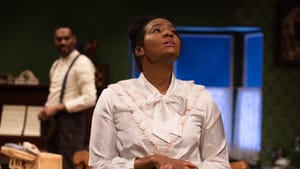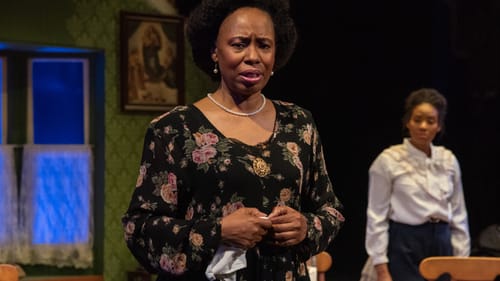Stay in the Loop
BSR publishes on a weekly schedule, with an email newsletter every Wednesday and Thursday morning. There’s no paywall, and subscribing is always free.
An American disease
Quintessence Theatre Group presents Angelina Weld Grimké’s ‘Rachel’

When I walked into the historic Sedgwick Theater lobby, the first thing I noticed (besides the crowd at the sold-out Saturday night performance of Angelina Weld Grimké’s Rachel) was a timeline written in chalk across the walls. The first entry is the year 1619: the start of the American slave trade. Other notable entries include the Civil War, from 1861 to 1865; the murder of Emmett Till in 1955; and the pending Justice for Victims of Lynching Act proposed in 2018. This timeline represents an abridged history of Black people in America.
A final entry, labelled 2012-2020, reads as follows:
African Americans including Trayvon Martin, Michael Brown, Sandra Bland, Freddie Gray, Eric Garner, Philando Castile among many others die at the hand of law enforcement. None of their killers convicted…
As I find myself in the middle of Black History Month and at the end of the national Black Lives Matter in Schools Week, I have been reflecting about what it means to be Black, especially a Black child, in this country historically, presently, and in the future. Which is why Quintessence Theatre Group’s production of Rachel, a century after it was originally written and produced, is more relevant than ever.
A lasting critique
Following the release of The Birth of a Nation in 1915, Angelina Weld Grimké was commissioned by the NAACP to write anti-racist and anti-lynching material that could counter the new narratives of white supremacy spreading via the medium of film. What she created was a beautiful tapestry of a Black American family contending with the anniversary of the lynching of their patriarch and son/sibling, while also dealing with the daily trials and traumas of racial discrimination, oppression, and violence. Credited as the first cultural production written by a Black woman, starring an all-Black cast, and premiered to an integrated audience in 1917 New York, Rachel is incisively written and tragically timeless. It’s a lasting critique of this nation’s failure to make good on its promises of life, liberty, and the equal pursuit of happiness—instead upholding a white, Christian, patriarchal, capitalist paradigm of society.
Palpable chemistry
A strong ensemble at Quintessence, anchored by Barrymore Award-winning actor Jessica Johnson as the titular Rachel Loving, brought this story to life. The energy and emotion Johnson embodied in this role was stunning to witness. Her final scenes left me teary-eyed and breathless. The chemistry of the cast was palpable, allowing for every actor to find small moments and subtle ways to shine without being a distraction from the story. Standouts include the physical comedy of Nathan Alford Tate as Jimmy Mason, and the smoldering intensity of Walter DeShields as Rachel’s romantic interest John Strong.
Rachel deals heavily with themes of motherhood, children, and financial and biological fertility. Characters contemplate the meaning of motherhood, whether it is birthing or rearing a child that makes one a mother, and what is a mother’s duty to her children born and unborn. Zuhairah McGill is poised and regal in the role of Rachel’s strong family matriarch. Mrs. Loving, affectionately known as “Ma’dear,” was critical in the unfolding of major plot points and setting the tone for the entire story. (Ma’dear is a term of endearment common in many African American families to refer to the family matriarch or some other elder female family member. Its derivative, “Madea,” inspired Tyler Perry.) The entire performance depended upon whether we could believe and empathize with the Loving family unit, and the familial dynamic between Mrs. Loving, Rachel, and Thomas Loving (Travoye Joyner, who added impeccable comedic timing into the mix) was irresistible.

Museum-worthy
In her director’s notes, Alexandra Espinoza explained how the Barnes Foundation’s 2019 30 Americans exhibition had been an inspiration. Her understanding and appreciation of the inherent artfulness of Black life, resilience, and ingenuity is clear: any single still from this production of Rachel could be museum-worthy.
This is also a credit to Marie Laster’s set design, which was simple, elegant, and meticulous, bringing us to the living room of a modest apartment in an unnamed Northern city. Everything from the vintage green wallpaper backdrop and the matching wooden floor, dining table, and chairs to an old upright piano made the stage feel authentic, welcoming, and well-lived-in, effectively inviting the audience into this intimate family drama.
Infecting all of us
Racism is an illness that infects both its spreader and its target. (Some psychologists have even suggested that in its extreme forms, racism is a mental illness.) And as more sciences target the study of racism and its effects over time, we are learning more about things like epigenetics, proving that trauma can be inherited across generations. What Rachel does particularly well is illuminate the physiological and psychological effects of racism: how it irrevocably changes you, physically and mentally ages you. Robs you of even the hope of a purposeful future. We witness as every character is transformed and must make sense of this irrational yet undeniable force in their lives. From the audience, you are compelled to question how you may also be infected, and why after all this time we have not figured out how to get well.
What, When, Where
Rachel. By Angelina Weld Grimké. Directed by Alexandra Espinoza. Through February 29, 2020, at the Sedgwick Theater, 7137 Germantown Ave., Philadelphia. (215) 987-4450 or quintessencetheatre.org.
The Sedgwick is a wheelchair-accessible venue. Seating arrangements can be made in advance with the box office at time of ticket purchase.
Sign up for our newsletter
All of the week's new articles, all in one place. Sign up for the free weekly BSR newsletters, and don't miss a conversation.

 Hanae Mason
Hanae Mason